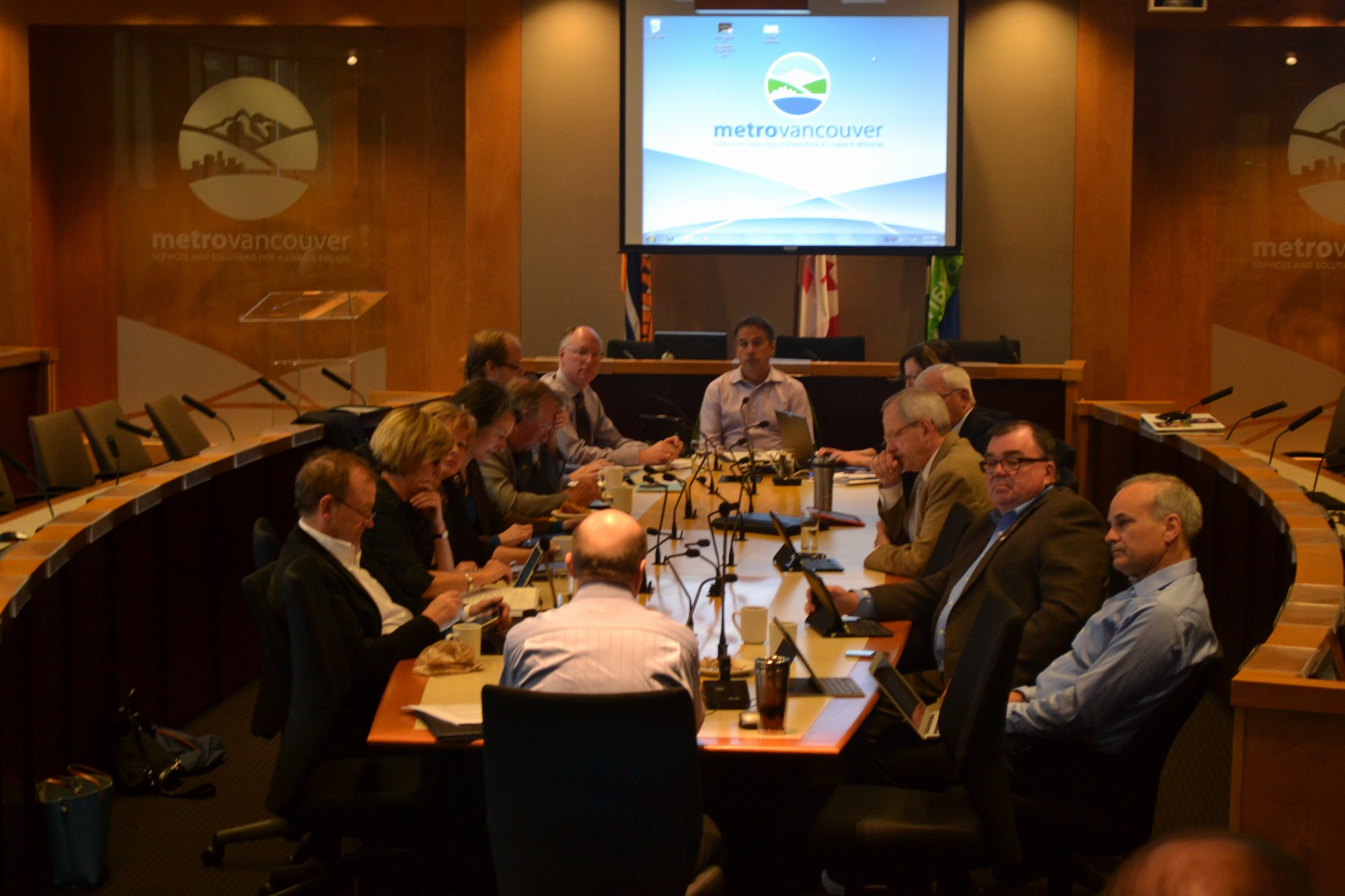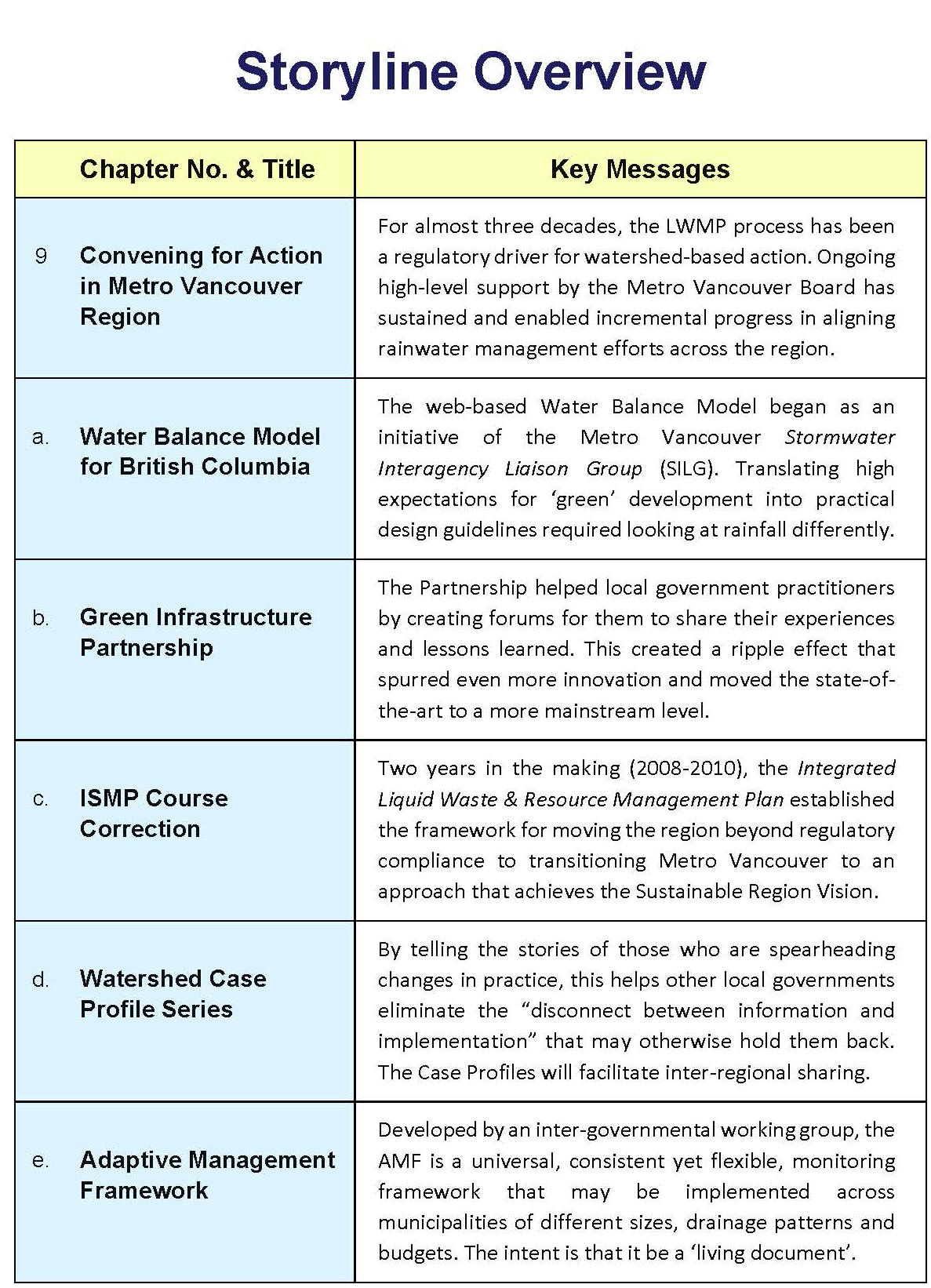“Beyond the Guidebook 2015″ introduced to Metro Vancouver’s Utilities Committee (Nov 2015)
Note to Reader:
Commencing in September 2011, Kim Stephens (Executive Director) regularly updates the Metro Vancouver Utilities Committee on the work of the Partnership for Water Sustainability in BC, and progress in implementing the Georgia Basin Inter-Regional Educational Initiative (IREI). In November 2015, he informed the Committee about release of Beyond the Guidebook 2015: Moving Towards “Sustainable Watershed Systems, through Asset Management”, an IREI program deliverable.
To read his written report to the Metro Vancouver Utilities Committee, download Presentation #8 – Progress update for period November 2014 through November 2015.
Introducing the New Paradigm – Watersheds as Infrastructure Assets
“The event of record for release of ‘Beyond the Guidebook 2015’ is the Water Balance Partners Forum hosted by Metro Vancouver at the Annacis Research Centre on November 5th,” stated Kim Stephens. “It is the third in a series, celebrates work by local government champions, and tells five ‘regional stories’, including Metro Vancouver, to showcase how everyone benefits from ‘sharing & learning’ through inter-regional collaboration.”
Benefits of Sharing and Learning
“We all learn from stories and the most compelling ones are based on the experiences of those who are leading in their communities. Through sharing, and learning from each other, inter-regional collaboration accelerates implementation of standards of practice – whether they be engineering, planning or environmental – that are affordable & effective in maintaining healthy watersheds and streams.”
 “Metro Vancouver experience is informing practice along the east coast of Vancouver Island. And vice versa. There are numerous anecdotes about cross-pollination of experience.”
“Metro Vancouver experience is informing practice along the east coast of Vancouver Island. And vice versa. There are numerous anecdotes about cross-pollination of experience.”
“Sharing and learning from each other saves everyone time and money because it avoids reinventing the wheel. In an era of limited resources, both people and financial, this is a critically important consideration.”
Watersheds are Integrated Systems
“We must change how we view and describe the landscape,” continued Kim Stephens. “In Beyond the Guidebook 2015, a key message is that a watershed system is an integrated system. It is also infrastructure, and must therefore be viewed as an asset that provides municipal services.”
“More specifically, the three natural pathways by which rainfall reaches streams provide ‘water balance services’. As such, protection and maintenance of the three pathways has financial, level-of-service and life-cycle implications for asset management.”
“Over the decades we have not managed watersheds as integrated systems. The consequences are cumulative impacts that manifest themselves as expensive fixes.”
“Over the next two years, the IREI program would progressively inform and educate an expanding network of practitioners…inside and outside local government…on how to achieve water balance (hydrologic) integrity and hence avoid those expensive fixes.”
Get It Right at the Front-End
“Everyone should know that the time to shape future life-cycle costs is at the community planning front-end,” emphasized Kim Stephens.
“The bulk of future population growth will be accommodated within existing developed areas. This creates the opportunity to get it right the second time as watersheds redevelop. The message is a simple one: get it right at the front-end; avoid a future liability.”
“The Metro Vancouver region’s Integrated Liquid Waste & Resource Management Plan provides the necessary regulatory framework to get it right. This is a starting point. It is then necessary to develop the right methodologies and tools to achieve the desired outcome.”
Apply the Right Methodologies and Tools
“It is no accident that the language in the Integrated Plan is very specific. There are no waffle words such as should, could or consider. Rather, the actions are framed as Metro Vancouver and municipalities WILL do this.”
“Clear language and guidance is great. But everyone still has to get it right. This is why understanding and applying the Water Balance Methodology is the foundation piece for managing watersheds as integrated systems.”
“With a $50,000 grant provided by Metro Vancouver, the Partnership was able to leverage federal-provincial funding to develop the online Water Balance Express for Landowners. Use of this tool will help municipalities and landowners comply with watershed targets.”
“We are in the early stages of an educational process. We have a long journey ahead of us. High level support from this committee is important factor in achieving the Partnership’s mission,” concluded Kim Stephens.
To Learn More:
Download Beyond the Guidebook 2015: Presentation to the Metro Vancouver Utilities Committee in November 2015 to view the complete storyline for the presentation by Kim Stephens.
The Metro Vancouver chapter in Beyond the Guidebook 2015 is 27 pages and is organized in six sections as shown below. To download a PDF copy and read the complete story, click on Convening for Action in Metro Vancouver.
To download a copy of the entire 158-page Beyond the Guidebook 2015: https://waterbucket.ca/viw/files/2015/11/Beyond-Guidebook-2015_final_Nov.pdf






